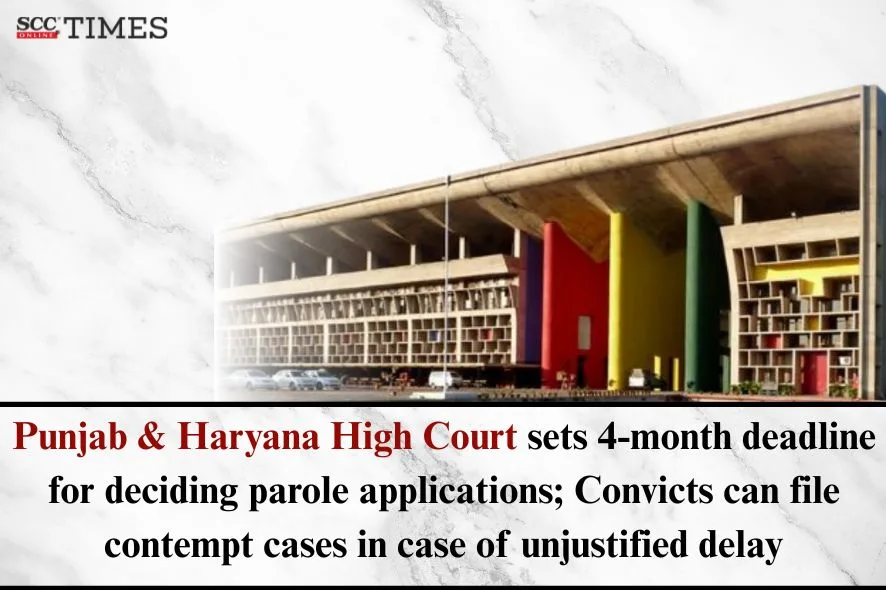Punjab and Haryana High Court: In a criminal writ petition filed by a convict seeking parole for six weeks to meet his family members, the Single Judge Bench of Harpreet Singh Brar, J., allowed the application, directing the District Magistrate(‘DM’), Moga, to decide the convict’s application in two weeks. The Court directed that all applications pertaining to temporary release on parole shall be decided by the authority concerned within four months from receipt of such application.
Background
In 2024, the convict was sentenced by the Trial Court, under Section 22 of the Narcotic Drugs and Psychotropic Substances Act, 1985, to rigorous imprisonment for 10 years along with a fine of Rs 1 Lakh. As per the custody certificate, the convict had undergone an actual sentence of 1 year, 8 months, and 24 days.
The convict contended that on 16-09-2024, he had filed an application under Section 3(1)(d) of the Punjab Good Conduct Prisoners (Temporary Release) Act, 1962 (‘the Act’) seeking temporary release on parole for eight weeks. However, almost 10 months passed, but no action was taken on the said application. He further contended that he was married with two children and his mother is suffering from various age-related ailments. Thus, he filed the present petition to provide support and care to his family.
Analysis
Upon perusal of the record, the Court noted that the Superintendent, Central Jail, forwarded the case of the petitioner to the DM, vide letter dated 16-09-2024. Further, the DM sought a report from the office of the Senior Superintendent of Police(‘SSP’), Moga. However, it appeared that the convict’s application for temporary release had been pending before the concerned authorities for the last 10 months.
The Court remarked that the very object of the Act was humanitarian in nature.
“Providing opportunities for temporary release ensures that the ties between the prisoner and society are not severed. Ensuring that the incarcerated have healthy roots in society greatly assists in their rehabilitation and reintegration.”
It also incentivizes the inmates to maintain good conduct while in custody, which aids the jail authorities in their administration as well.
The Court further stated that it was deeply concerning that State agencies display such laxity in dealing with applications for temporary release. The administration cannot truly comprehend the value of liberty as perceived by a prisoner, who lives its absence every single day. The Court added that such an undisciplined approach was symptomatic of the culture of apathy that has developed on the subject of rights and well-being of convicts. The Court said,
“In denying them their legal right to be considered for temporary release under a statute that has been created for this very purpose, the authorities have essentially categorized them as second-class citizens.”
The Court opined that, prima facie, the casual and lackadaisical conduct of the concerned authorities could not be allowed to continue unchecked. The competent authority was required to assess the case and pass a reasoned order, either accepting or rejecting the application for temporary release, within a reasonable time.
“The incarcerated could not be expected to live at the whims and fancies of the State, and neither does their incarceration entitle the administration to jeopardize their fundamental rights under Article 21 of the Constitution of India.”
In this regard, the Court referred to Sunil Batra v. Delhi Admn. (1978) 4 SCC 494, wherein the Supreme Court held that all prisoners shall be entitled to all the rights bestowed upon the citizens by the Constitution of India.
Thus, noting that the petitioner had already undergone almost 2 years of his sentence, the Court allowed the petition by directing the DM to decide the convict’s parole application expeditiously, preferably within two weeks from the date of receipt of the certified copy of this order.
The Court further underscored that any unjustified delay in hearing applications for temporary release, which often pertain to situations of emergency, further exacerbates the plight of the convict. The Act specified certain situations where release for a convict on parole may be warranted. Since the statute itself bestows the convict with the right to be considered for temporary release and enlists circumstances therefor, the Court held that it was even more vital to decide such applications expeditiously.
Accordingly, the Court directed that all applications pertaining to temporary release on parole shall be decided by the authority concerned within four months from receipt of such application. The Court further directed that if these directions were not adhered to without any justifiable cause, the convicts would be at liberty to move an application under Article 215 of the Constitution seeking initiation of contempt of Court proceedings against the officials concerned.
[Jaspal Singh v. State of Punjab, 2025 SCC OnLine P&H 3831, decided on 09-07-2025]
Advocates who appeared in this case :
For the petitioner: Lakhwinder Singh Lakhanpal
For the respondent: Subhash Godara, Addl. A.G., Punjab



